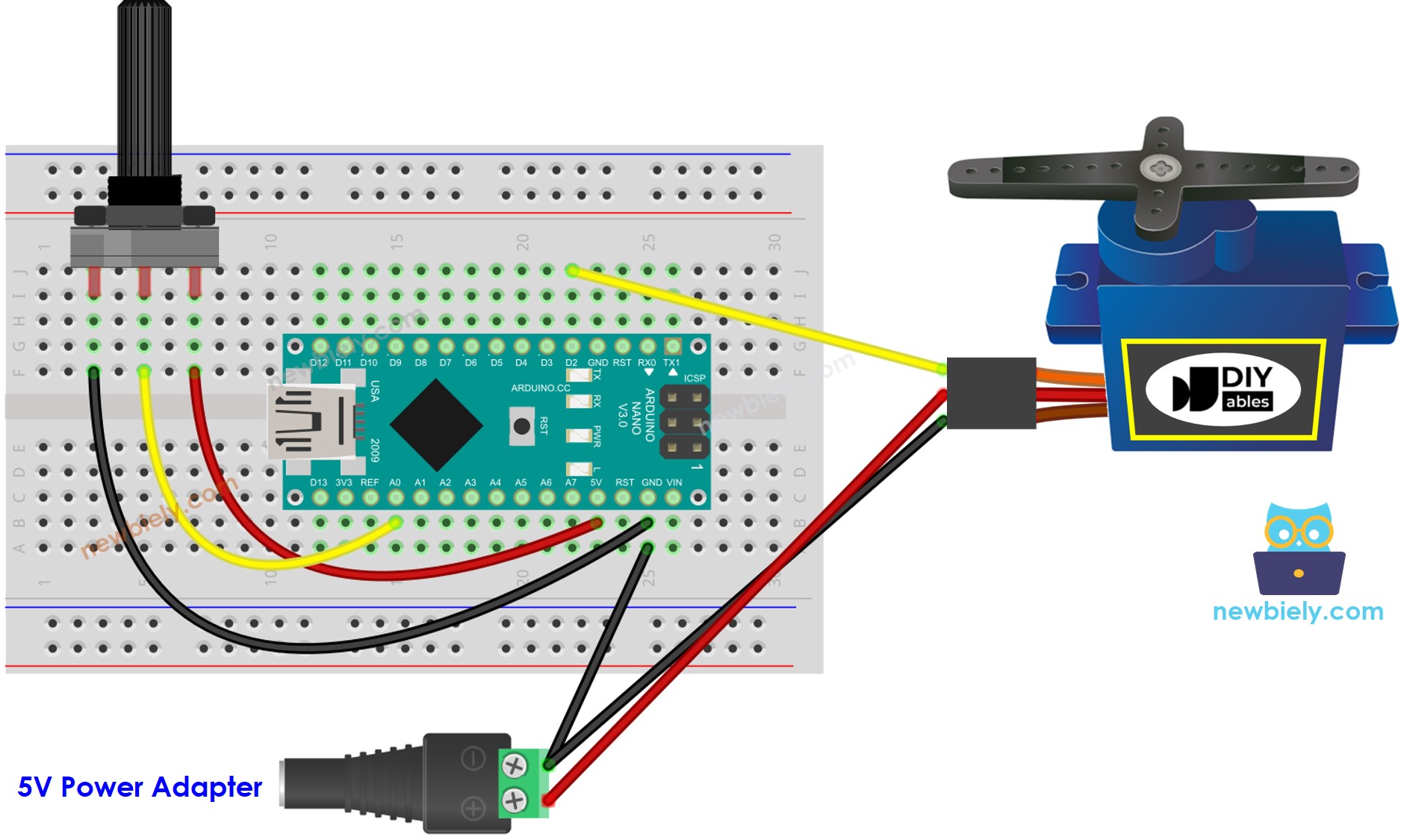Arduino Nano - Potentiometer Servo Motor
This tutorial instructs you how to use Arduino Nano to control the angle of a servo motor based on the input value from a potentiometer. In detail, we will learn:
- How to connect the potentiometer and servo motor to Arduino Nano
- How to program Arduino Nano to read the value from a potentiometer and control a servo motor accordingly.
Hardware Preparation
Or you can buy the following kits:
| 1 | × | DIYables Sensor Kit (30 sensors/displays) | |
| 1 | × | DIYables Sensor Kit (18 sensors/displays) |
Disclosure: Some of the links provided in this section are Amazon affiliate links. We may receive a commission for any purchases made through these links at no additional cost to you.
Additionally, some of these links are for products from our own brand, DIYables .
Additionally, some of these links are for products from our own brand, DIYables .
Overview of Servo Motor and Potentiometer
If you are unfamiliar with servo motors and potentiometers, including their pinouts, how they work, and how to program them, the following tutorials can help:
Wiring Diagram

This image is created using Fritzing. Click to enlarge image
See The best way to supply power to the Arduino Nano and other components.
How To Program
- Retrieves the value of the potentiometer, which is a number between 0 and 1023.
int analog_value = analogRead(A0);
- Scale it to an angle in the range of 0 to 180.
int angle = map(analog_value, 0, 1023, 0, 180);
- Control the servo to the specified angle.
servo.write(angle);
Arduino Nano Code
/*
* This Arduino Nano code was developed by newbiely.com
*
* This Arduino Nano code is made available for public use without any restriction
*
* For comprehensive instructions and wiring diagrams, please visit:
* https://newbiely.com/tutorials/arduino-nano/arduino-nano-potentiometer-servo-motor
*/
#include <Servo.h>
Servo servo; // create servo object to control a servo
void setup() {
// Initialize the Serial to communicate with the Serial Monitor.
Serial.begin(9600);
servo.attach(2); // attaches the servo on pin D2 to the servo object
}
void loop() {
// reads the value of the potentiometer (value between 0 and 1023)
int analog_value = analogRead(A0);
// scales it to use it with the servo (value between 0 and 180)
int angle = map(analog_value, 0, 1023, 0, 180);
// sets the servo position according to the scaled value
servo.write(angle);
// print out the value
Serial.print("Analog: ");
Serial.print(analog_value);
Serial.print(", Angle: ");
Serial.println(angle);
delay(100);
}
Detailed Instructions
- Plug the USB cable into the Arduino Nano and PC.
- Launch the Arduino IDE and select the appropriate board and port.
- Open the code in the Arduino IDE.
- To send the code to the Arduino Nano, press the Upload button on the Arduino IDE.

- Open the Serial Monitor
- Turn the potentiometer
- Check out the servo motor's rotation
- Check the outcome on the Serial Monitor
COM6
Analog: 0, Angle: 0
Analog: 85, Angle: 14
Analog: 201, Angle: 35
Analog: 286, Angle: 50
Analog: 370, Angle: 65
Analog: 444, Angle: 78
Analog: 521, Angle: 91
Analog: 608, Angle: 106
Analog: 690, Angle: 121
Analog: 793, Angle: 139
Analog: 907, Angle: 159
Analog: 1023, Angle: 180
Analog: 1023, Angle: 180
Autoscroll
Clear output
9600 baud
Newline
Code Explanation
Check out the line-by-line explanation contained in the comments of the source code!
